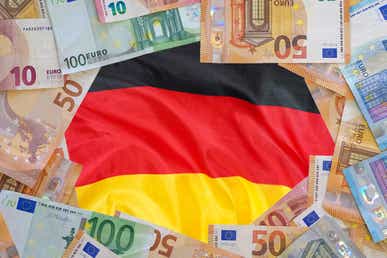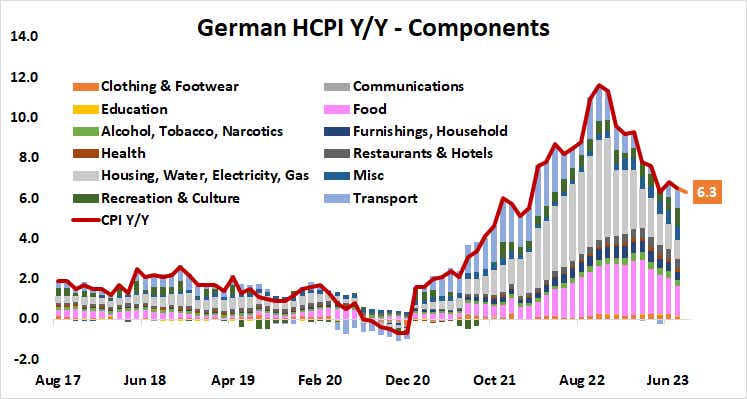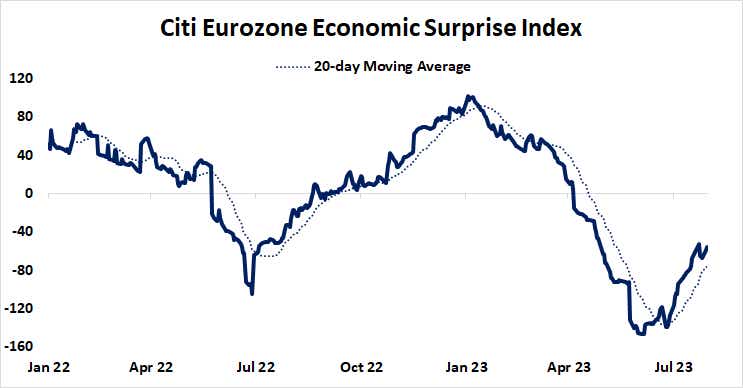German CPI Preview: There is a Short Euro Trade to Consider if Soft Data Cools ECB Rate Hike Bets

German CPI Preview: There is a Short Euro Trade to Consider if Soft Data Cools ECB Rate Hike Bets
By:Ilya Spivak
The Euro will probably face the worst of selling pressure if German CPI inflation data cools ECB rate hike bets
- German inflation data to highlight ECB stagflation puzzle despite prices cooling.
- Food prices are tough to affect with tightening as the economy sinks into recession.
- The euro may fall if CPI prints softer than expected, downgrading rate hike outlook.
The euro is in sellers’ crosshairs as German consumer price index (CPI) data puts the spotlight on the stagflation puzzle facing the European Central Bank (ECB). Policymakers are trying to tame price growth in an economy on the cusp of recession, if not already in one.
The currency bloc’s largest economy is expected to report that headline inflation fell to 6.3% year-on-year in August, down from 6.5% in July and matching the 15-month low recorded in May. While that’s a significant climbdown from the peak at 11.6% in October 2022, it remains miles away from the ECB’s target 2%.
Can the ECB bring down German inflation?
Most of the problem is still on the “goods” side of the ledger, unlike services-driven inflation in the U.S. Falling gas prices have been the main driver of disinflation from last year’s highs. Food prices have taken over as the largest contributing factor, with bread and cereals making up the biggest piece of the pie.

This makes for a thorny problem for the ECB. Trying to bring down food inflation with interest rate hikes is a tough job in the best of times. There’s not much that the central bank can do with borrowing costs to turn off hunger or reroute demand for basic staples, like bread.
It is harder still when the economy is already shrinking. The latest set of Purchasing Managers Index (PMI) surveys from S&P Global showed manufacturing- and service-sector activity growth contracted at the fastest pace in 39 months. Nevertheless, market-based measures of inflation expectations are trending higher and beckoning the ECB to act.
Euro may suffer if soft inflation data cools rate hike bets
The dire economic situation has already weighed on the outlook for ECB action. Traders now price in a 76.5% probability of another 25-basis-point (bps) rate hike by year-end, which they expect will cap the tightening cycle. That marks a modest cooling from certainty (i.e., 100% priced-in probability) in this outcome after the central bank’s last meeting in late July and the 85% chance assigned to it a week ago.

Realized economic data outcomes from the Eurozone still tend to undershoot baseline projections according to data from Citigroup. The margin of disappointment improved a bit in August, but figures from Bloomberg suggest that this reflects downgraded forecasts rather than improvement in the economy’s momentum. So, surprise risk still looks to be tilted on the downside.
A soft result may continue to work against the odds of another ECB rate hike, giving the central bank some cover to hold back tightening the screws on an already suffering economy. That is likely to weigh on the euro against the U.S. dollar, where it would amplify a widening of yield differentials against the common currency. Rate spreads have already moved by close to 100bps in the greenback’s favor over the past four months amid repricing for a more hawkish Federal Reserve.
Ilya Spivak, tastylive head of global macro, has 15 years of experience in trading strategy, and he specializes in identifying thematic moves in currencies, commodities, interest rates and equities. He hosts Macro Money and co-hosts Overtime, Monday-Thursday. @Ilyaspivak
For live daily programming, market news and commentary, visit tastylive or the YouTube channels tastylive (for options traders), and tastyliveTrending for stocks, futures, forex & macro.
Trade with a better broker, open a tastytrade account today. tastylive, Inc. and tastytrade, Inc. are separate but affiliated companies.
Options involve risk and are not suitable for all investors. Please read Characteristics and Risks of Standardized Options before deciding to invest in options.
tastylive content is created, produced, and provided solely by tastylive, Inc. (“tastylive”) and is for informational and educational purposes only. It is not, nor is it intended to be, trading or investment advice or a recommendation that any security, futures contract, digital asset, other product, transaction, or investment strategy is suitable for any person. Trading securities, futures products, and digital assets involve risk and may result in a loss greater than the original amount invested. tastylive, through its content, financial programming or otherwise, does not provide investment or financial advice or make investment recommendations. Investment information provided may not be appropriate for all investors and is provided without respect to individual investor financial sophistication, financial situation, investing time horizon or risk tolerance. tastylive is not in the business of transacting securities trades, nor does it direct client commodity accounts or give commodity trading advice tailored to any particular client’s situation or investment objectives. Supporting documentation for any claims (including claims made on behalf of options programs), comparisons, statistics, or other technical data, if applicable, will be supplied upon request. tastylive is not a licensed financial adviser, registered investment adviser, or a registered broker-dealer. Options, futures, and futures options are not suitable for all investors. Prior to trading securities, options, futures, or futures options, please read the applicable risk disclosures, including, but not limited to, the Characteristics and Risks of Standardized Options Disclosure and the Futures and Exchange-Traded Options Risk Disclosure found on tastytrade.com/disclosures.
tastytrade, Inc. ("tastytrade”) is a registered broker-dealer and member of FINRA, NFA, and SIPC. tastytrade was previously known as tastyworks, Inc. (“tastyworks”). tastytrade offers self-directed brokerage accounts to its customers. tastytrade does not give financial or trading advice, nor does it make investment recommendations. You alone are responsible for making your investment and trading decisions and for evaluating the merits and risks associated with the use of tastytrade’s systems, services or products. tastytrade is a wholly-owned subsidiary of tastylive, Inc.
tastytrade has entered into a Marketing Agreement with tastylive (“Marketing Agent”) whereby tastytrade pays compensation to Marketing Agent to recommend tastytrade’s brokerage services. The existence of this Marketing Agreement should not be deemed as an endorsement or recommendation of Marketing Agent by tastytrade. tastytrade and Marketing Agent are separate entities with their own products and services. tastylive is the parent company of tastytrade.
tastyfx, LLC (“tastyfx”) is a Commodity Futures Trading Commission (“CFTC”) registered Retail Foreign Exchange Dealer (RFED) and Introducing Broker (IB) and Forex Dealer Member (FDM) of the National Futures Association (“NFA”) (NFA ID 0509630). Leveraged trading in foreign currency or off-exchange products on margin carries significant risk and may not be suitable for all investors. We advise you to carefully consider whether trading is appropriate for you based on your personal circumstances as you may lose more than you invest.
tastycrypto is provided solely by tasty Software Solutions, LLC. tasty Software Solutions, LLC is a separate but affiliate company of tastylive, Inc. Neither tastylive nor any of its affiliates are responsible for the products or services provided by tasty Software Solutions, LLC. Cryptocurrency trading is not suitable for all investors due to the number of risks involved. The value of any cryptocurrency, including digital assets pegged to fiat currency, commodities, or any other asset, may go to zero.
© copyright 2013 - 2026 tastylive, Inc. All Rights Reserved. Applicable portions of the Terms of Use on tastylive.com apply. Reproduction, adaptation, distribution, public display, exhibition for profit, or storage in any electronic storage media in whole or in part is prohibited under penalty of law, provided that you may download tastylive’s podcasts as necessary to view for personal use. tastylive was previously known as tastytrade, Inc. tastylive is a trademark/servicemark owned by tastylive, Inc.
Your privacy choices